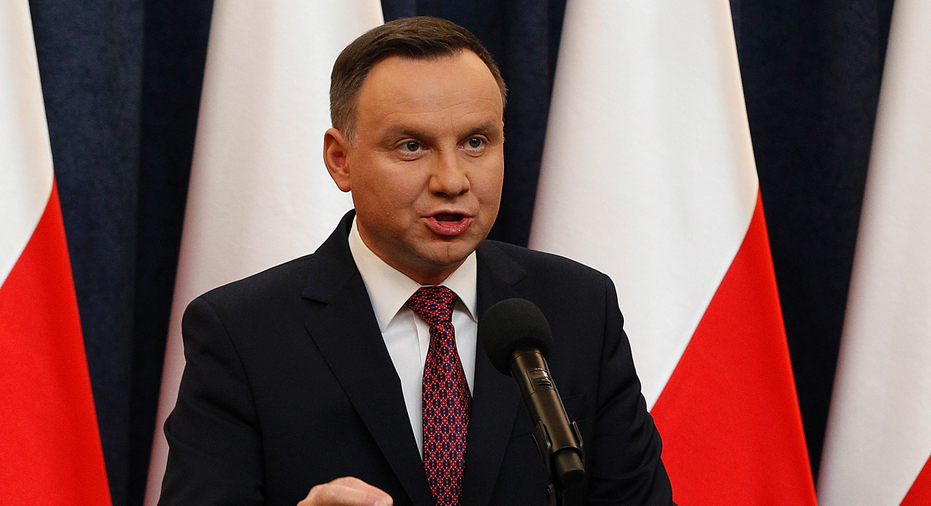Polish president signs laws that led to EU sanction threat

WARSAW, Poland – Poland's president signed two laws Wednesday that complete a sweeping government overhaul of the country's justice system, ignoring a warning from the European Union that the legislation breached fundamental democratic principles and could lead to unprecedented sanctions.
President Andrzej Duda's approval of the laws he had a hand in drafting was not unexpected, but his announcement came hours after the EU's executive body triggered proceedings over a series of legal changes that give the Polish government more control over the judiciary and courts.
Duda emphatically defended the legislation in a television interview on Wednesday night. He accused the EU of hypocrisy" and some of its leaders of "lying" with the suggestion that Poland is acting with disregard for basic European values.
The developments reflect a dramatic historical reversal for Poland, the birthplace of an anti-communist movement in the 1980s that inspired people across Eastern Europe and has been held up as a model of democratic transition for more than a quarter century.
The right-wing Law and Justice party that has ruled Poland for two years has enacted several laws that critics say erode the separation of powers between the executive and judicial branches and could interfere with defendants receiving fair trials.
The European Commission announced Wednesday that it was invoking what is known as Article 7 — essentially putting Poland on notice that it is at risk of contravening EU law — in response.
Though the step was historic — no EU state has ever been censured in this way — for now it is largely symbolic and reflects the escalating tensions between Poland's populist government and its EU partners.
The final step in the process would involve sanctions, including the loss by Poland of its voting rights in the Council. This step, however, is considered unlikely to happen because it requires unanimity of EU countries, and Hungary's government has vowed to block any such move.
"We are doing this for Poland, for Polish citizens," so they can rely on a fully independent judiciary in their nation, EU Commissioner Frans Timmermans said in announcing the decision.
Timmermans said the decision was taken with a "heavy heart" but had become unavoidable because Poland's authorities could not be persuaded to abandon laws that have been condemned not only by the EU but also by the United Nations, the Organization for Security and Cooperation in Europe and the Council of Europe, the continent's top human rights body.
Poland's government, which has defiantly gone forward with its changes to the legal system despite repeated warnings from the EU, took the decision in its stride.
In announcing his decision to sign the laws, Duda passionately defended them against unnamed critics. He argued that putting courts and judges under greater political control will make them more accountable to regular Poles, ending an unaccountable oligarchy of judges.
"I really believe that extremely democratic solutions are being introduced in Poland with these legal changes," Duda said. "The idea that they are violating democratic rules — it's actually the exact opposite. I am convinced that this deepens democracy in the judicial system."
He suggested it was unfair to judge Poland for making judges more accountable to politicians, noting that the appointment of judges to the U.S. Supreme Court is also a political process.
The Polish president accused Timmermans during the interview with Polsat News TV of rejecting every argument from Poland and of applying a "dictate" that the country "will not accept."
The European Commission must now submit a request to the EU member states to declare "a clear risk of serious breach of the rule of law" in Poland. That is essentially a warning, or in EU lingo, a "preventative" measure, that will require that acceptance of 22 EU countries.
The procedure carries a number of risks. Targeting Poland could increase anti-EU sentiment in one of member countries where support for the bloc is highest, with more than 80 percent approval.
The move also could expose the EU as largely impotent at a time when it is struggling with other blows to its rationale for existing, including Britain's withdrawal and the huge numbers of migrants stuck in Italy and Greece that the bloc is struggling to relocate.
Even some of the government's staunchest critics have opposed the step, fearing it will create a sense among some Poles — particularly those who do not understand the complexities of the judicial laws — that they are being targeted unfairly by the EU.
Ryszard Czarnecki, a member of Law and Justice and the vice president of the European Parliament, called the step an "anti-Polish" move that is really meant to punish Poland for not taking migrants in a mandatory EU resettlement plan.
As expected, Hungary came to Poland's defense.
Zsolt Semjen, the deputy prime minister, described the EU decision as "unprecedented and astounding" and reiterated the intention of Hungarian Prime Minister Viktor Orban to block any sanctions.
"The decision seriously damages Poland's sovereignty," Semjen told state news wire MTI. "It is unacceptable that Brussels is putting pressure on sovereign member states and arbitrarily punishing democratically elected governments."
___
Raf Casert in Brussels and Pablo Gorondi in Budapest contributed.



















